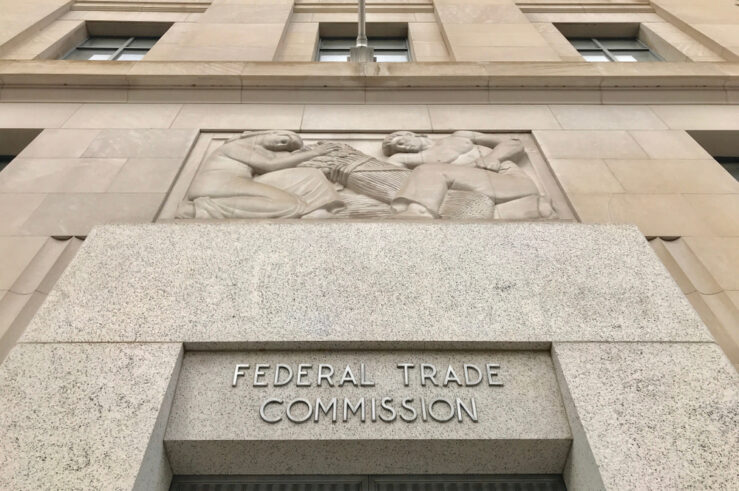Showing results for: “digital markets act”
What Do the NetChoice Cases Mean for Online Speech?
With the release of the U.S. Supreme Court’s NetChoice opinion (along with some other boring case people seem to want to talk about), opinions for the October 2023 term appear to be complete. After discussing what Murthy v. Missouri means for online speech, it only feels right to discuss the other big social-media case of ... What Do the NetChoice Cases Mean for Online Speech?
The NCAA: Dr Jekyll or Mr Hyde?
The U.S. Supreme Court will hear a challenge next month to the 9th U.S. Circuit Court of Appeals’ 2020 decision in NCAA v. Alston. Alston affirmed a district court decision that enjoined the National Collegiate Athletic Association (NCAA) from enforcing rules that restrict the education-related benefits its member institutions may offer students who play Football ... The NCAA: Dr Jekyll or Mr Hyde?
NLRB Targeting of Noncompetes Lacks a Sound Legal Foundation
Jennifer Abruzzo, general counsel of the National Labor Relations Board (NLRB), recently issued a memo claiming that certain noncompete clauses in labor contracts are illegal, on grounds that they violate employees’ right to organize and negotiate better working conditions under Section 7 of the National Labor Relations Act (NLRA). The NLRB isn’t the first Biden ... NLRB Targeting of Noncompetes Lacks a Sound Legal Foundation
No Ovation for FTC's Latest Enforcement Theory
The Federal Trade Commission announced a puzzling complaint filed in a new consummated merger & monopolization case in the U.S. District Court for the District of Minnesota. Here’s the explanation of the case from the press release: The Federal Trade Commission today filed a complaint in federal district court challenging Ovation Pharmaceuticals, Inc.’s January 2006 ... No Ovation for FTC's Latest Enforcement Theory
Justice Department Ignores the Benefits of Contracting Freedom in its Crabbed Reading of Music Distribution Decrees
The Antitrust Division of the U.S. Department of Justice (DOJ) ignored sound law and economics principles in its August 4 decision announcing a new interpretation of seventy-five year-old music licensing consent decrees it had entered into separately with the two major American “performing rights organizations” (PROs) — the American Society of Composers, Authors, and Publishers ... Justice Department Ignores the Benefits of Contracting Freedom in its Crabbed Reading of Music Distribution Decrees
Commissioner Wright’s Call for Section 5 Guidance Getting Attention on Capitol Hill
Late this summer, TOTM hosted a blog symposium on potential guidelines for the Federal Trade Commission’s exercise of its “unfair methods of competition” authority under Section 5 of the FTC Act. Commissioner Josh Wright inspired the symposium by proposing a set of enforcement guidelines for the Commission. Shortly thereafter, Commissioner Maureen Ohlhausen proposed her own guidelines, which were largely consistent with ... Commissioner Wright’s Call for Section 5 Guidance Getting Attention on Capitol Hill
What Does Murthy v Missouri Mean for Online Speech?
After a lot of anticipation from Supreme Court watchers, the Murthy v. Missouri opinion has finally been released. As the oral argument suggested, standing was the issue for the Court, who in a 6-3 decision written by Justice Amy Coney Barrett ruled that none of the plaintiffs had standing, due to a lack of traceability ... What Does Murthy v Missouri Mean for Online Speech?
The FTC’s NPRM on Noncompete Clauses: Flirting with Institutional Crisis
The Federal Trade Commission’s (FTC) Jan. 5 “Notice of Proposed Rulemaking on Non-Compete Clauses” (NPRMNCC) is the first substantive FTC Act Section 6(g) “unfair methods of competition” rulemaking initiative following the release of the FTC’s November 2022 Section 5 Unfair Methods of Competition Policy Statement. Any final rule based on the NPRMNCC stands virtually no ... The FTC’s NPRM on Noncompete Clauses: Flirting with Institutional Crisis
The SEC recommends broker-dealer fiduciary duties
The SEC staff, acting under Dodd-Frank §913(g), has decided to recommend a “uniform fiduciary standard” for broker-dealers and investment advisors who provide investment advice to retail customers. The recommended rules would provide that the standard of conduct for all brokers, dealers, and investment advisers, when providing personalized investment advice about securities to retail customers (and ... The SEC recommends broker-dealer fiduciary duties
The Internationalization of Due Process, Federal Antitrust Enforcement, and the Rule of Law
The acceptance and implementation of due-process standards confer a variety of welfare benefits on society. As Christopher Yoo, Thomas Fetzer, Shan Jiang, and Yong Huang explain, strong procedural due-process protections promote: (1) compliance with basic norms of impartiality; (2) greater accuracy of decisions; (3) stronger economic growth; (4) increased respect for government; (5) better compliance ... The Internationalization of Due Process, Federal Antitrust Enforcement, and the Rule of Law
Weyerhaeuser and the Search for Antitrust’s Holy Grail (Part I)
While the antitrust nerds of the world (including yours truly) have been all atwitter over Leegin’s renunciation of Dr. Miles, another antitrust decision from October Term 2006 may turn out to be more significant in the long run. I’m speaking of Weyerhaeuser Co. v. Ross-Simmons Hardwood Lumber Co., in which the Supreme Court considered whether ... Weyerhaeuser and the Search for Antitrust’s Holy Grail (Part I)
The FTC’s PAE Study Recommendations: Case Not Proven
On October 6, 2016, the U.S. Federal Trade Commission (FTC) issued Patent Assertion Entity Activity: An FTC Study (PAE Study), its much-anticipated report on patent assertion entity (PAE) activity. The PAE Study defined PAEs as follows: Patent assertion entities (PAEs) are businesses that acquire patents from third parties and seek to generate revenue by asserting ... The FTC’s PAE Study Recommendations: Case Not Proven










